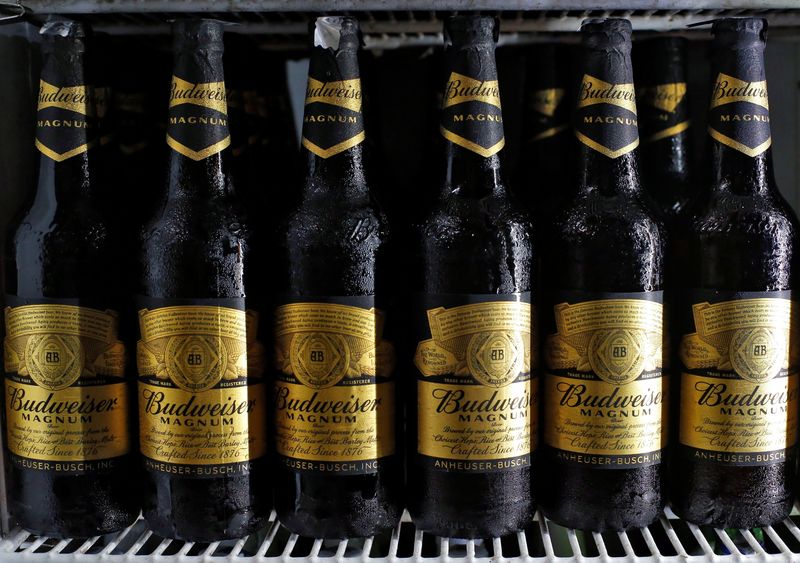By Emma Rumney
LONDON (Reuters) -Anheuser-Busch InBev outshone rival alcohol producers who had struck a downbeat tone in their quarterly results, but even the world's biggest brewer was cautious on Thursday amid low consumer confidence and emerging market turmoil.
The Belgian group's forecast-beating profits cheered investors after a series of missed forecasts and warnings of trouble ahead from other beer and spirits companies as consumers dealing with a cost of living crisis have cut back on drinking or swapped expensive labels for cheaper ones.
Spirits makers especially have faced a serious downturn after a post-pandemic boom in sales, where cash-flush consumers splashed out on expensive drinks. Pricier labels are now instead gathering dust on shelves around the world.
Shares in Diageo (LON:DGE), the world's biggest spirits maker, fell more than 9% to a four-year low on Tuesday after it warned that serious challenges endured in its most recent financial year could persist into the next.
Heineken (AS:HEIN) shares also dropped by nearly as much on Monday, when the No.2 brewer by volumes said cooler and wetter weather in parts of Europe had hurt sales as people went out less to pubs and restaurants. That meant it would achieve lower annual operating profit growth than analysts expected, it said.
AB InBev's volumes and revenue also missed estimates and it maintained its full-year forecast for between 4% and 8% core profit growth despite exceeding expectations in the second quarter.
Chief financial officer Fernando Tennenbaum said the target range was medium-term and it would not change it on a quarterly basis.
He added that the trends driving its outperformance in the first half were expected to continue, but pressures related to weather and tough economic conditions in some markets could weigh going forward.
SPIRITS SUFFER
Some investors said the cost of living crisis had shown that the spirits companies' core strategy - steering drinkers towards more expensive labels - was more vulnerable to economic conditions than previously thought.
Consumers were resistant to further price increases, thinking twice before buying bottles of liquor and switching to cheaper products, Moritz Kronenburger, a portfolio manager at Germany's Union Investment said.
He added that while likely temporary it was unclear how long this would last.
In emerging markets like Mexico, Diageo has been losing market share as some drinkers swap international spirits for local brands with Mexican heritage.
Heineken meanwhile has been struggling in Vietnam amid tough economic conditions and stricter drink-driving laws. AB InBev was also hit by bad weather in China, as well as spiralling sales in inflation-hit Argentina, dragging volumes down.
GEN Z DRINKS LESS?
Longer-term, some investors wonder whether a shift to healthier lifestyles could dent sales as people cut back on alcohol. Gen Z in particular is thought to drink less.
Diageo Chief Executive Debra Crew said that while Gen Z consumers in the United States have a preference for moderation, data shows they are spending more on spirits than millennials at the same age.
That could mean they are more likely to buy a few cocktails rather than drink beers. That for now appears to work more in favour of spirits companies, said Fred Mahon, fund manager at spirits investor Church House.

Church House has, however, sold out of beer stocks, concerned that such trends are driving a long-term decline in beer volumes in key markets like the United States, where a large number of blue collar workers used to fuel consumption, Mahon said.
"People don't have those careers as much, their children might work in an office in a city - it is just a different environment."